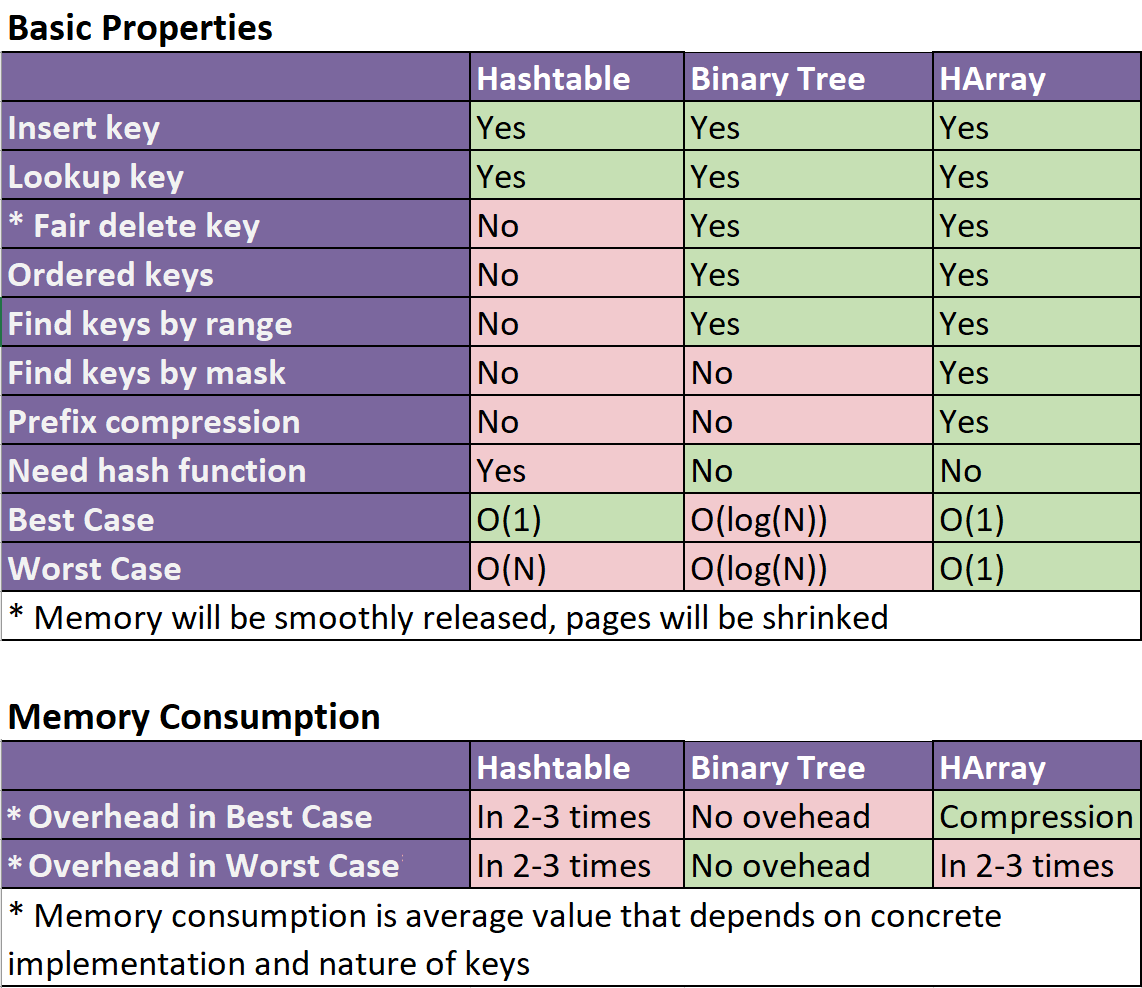https://github.com/Bazist/HArray
Fastest Trie structure (Linux & Windows)
https://github.com/Bazist/HArray
benchmark cplusplus data-structures fast trie
Last synced: 8 months ago
JSON representation
Fastest Trie structure (Linux & Windows)
- Host: GitHub
- URL: https://github.com/Bazist/HArray
- Owner: Bazist
- License: gpl-3.0
- Created: 2016-10-17T20:12:33.000Z (about 9 years ago)
- Default Branch: master
- Last Pushed: 2022-12-26T18:35:11.000Z (almost 3 years ago)
- Last Synced: 2024-11-09T19:39:41.061Z (about 1 year ago)
- Topics: benchmark, cplusplus, data-structures, fast, trie
- Language: C++
- Homepage:
- Size: 15.9 MB
- Stars: 92
- Watchers: 12
- Forks: 10
- Open Issues: 2
-
Metadata Files:
- Readme: README.md
- License: LICENSE
Awesome Lists containing this project
README
# HArray
[](https://img.shields.io/github/actions/workflow/status/Bazist/HArray/build.yml)
## Probably, this is most optimized Trie structure in the World ! Thats all what you need know about this project :)
**HArrayInt** - Key\Value In Memory structure for 32bit keys
**HArray** - Key\Value In Memory structure for keys with variety size
**HArrayChar** - Wrapper for HArray with interfaces: char* key, uint32 keyLen, char* value, uint32 valueLen
**HArrayUniqueIntValueList** - Wrapper for HArray with inteterfaces: uint32* key, uint32 keyLen, List\ listOfUniqueValues
------------------
## [Start overview from Benchmarks](https://github.com/Bazist/HArray/blob/master/Benchmarks.md)
------------------
### Overview
- **High optimized** Trie structure implemented in more than **8K lines**
- Tested on **1 Billion keys** succesfully
- **Keys with variable length** inside one instance of the container
- **Without any Stop World** events such as Rebuild/Rehashing on Insert key.
- **Without any Hash Functions**, the container has adpative algorithm for different nature of keys
- **Scan by Prefix/Scan by Range** functionality as bonus
- **All Keys are sorted**. Ability to set your **Custom Order** of Keys
- **Predictable** behaviour even in worst case: smoothly consuming memory, almost constantly latency on insert/lookup
- **Prefix Compression** helps reduce memory when keys have the same prefix: urls, file paths, words etc.
- **Serialize/Deserialize** from/to file at a speed close to the max speed of the hard drive
- **Fair Delete** operation with smoothly dismantling each Key.
Dead fibres are used for insert new keys, so structure perfect works in massive insert/delete scenarios.
------------------
## Build Library and Benchmarks
### Prerquisites
The following need to be installed and configured on development box:
- C++ development tools.
- [CMake](https://cmake.org/).
### Build on Linux and Mac
```bash
mkdir build
cmake -Bbuild
cd build && make
```
To build release version of the library and benchmarks run instead:
```bash
cmake -Bbuild -DCMAKE_BUILD_TYPE=Release
```
The library (`libharray.a`) and benchmark application (`HArrayBenchmark`) will be created in `build` folder.
### Build on Windows
```cmd
md build
cmake -Bbuild
msbuild build\HArray.sln
```
To build release version run:
```cmd
msbuild build\HArray.sln /property:Configuration=Release
```
The benchmark application `HArrayBenchmark.exe` together with static library `libharray.lib` will be in `build\Debug` or `build\Release` folder.
## Why we love Trie ? Because it has much more functionality and stability than Hashtables and much more faster than Binary Trees. Let's compare properties:

------------------
## Trie ? I heard about Trees and Hastables but don't know anything about Trie
# [Explain me as for Beginners](https://github.com/Bazist/HArray/blob/master/Trie_for_beginners.md)
### Examples
Initialize container
```c++
#include "HArray.h"
HArray ha;
ha.init(); //ha.init(24) set your custom capacity for big datasets
```
Insert a key
```c++
uint32 key[] = { 10, 20, 30, 40 };
uint32 keyLen = sizeof(key) / 4; //in key segments
uint32 value = 1;
ha.insert(key, keyLen, value);
```
Get value by key. Will return 0 if key is not found
```c++
uint32 value;
if(ha.getValueByKey(key, keyLen, value))
{
printf("%d", value)
}
else
{
//key is not found
}
```
Get all keys by range from min key to max key.
```c++
HArrayPair pairs[5];
uint32 pairsSize = 5;
uint32 minKey[] = { 10, 10 };
uint32 minKeyLen = sizeof(minKey) / 4; //in key segments
uint32 maxKey[] = { 20, 20 };
uint32 maxKeyLen = sizeof(maxKey) / 4; //in key segments
uint32 count = ha.getKeysAndValuesByRange(pairs, pairsSize, minKey, minKeyLen, maxKey, maxKeyLen);
for (uint32 i = 0; i < count; i++)
{
uint32* key = pairs[i].Key;
uint32 keyLen = pairs[i].KeyLen;
uint32 value = pairs[i].Value;
//here your code
}
```
Scan all keys through visitor
```c++
bool visitor(uint32* key, uint32 keyLen, uint32 value, uchar8 valueType, void* pData)
{
//handle founded key here
// ...
//return true to continue scaning or false otherwise
return true;
}
//Start scanning
void* pData = 0; //useful data in context
ha.scanKeysAndValues(&visitor, pData);
```
Serialize/Deserialize containter from/to file
```c++
ha.saveToFile("c:\\dump");
ha.loadFromFile("c:\\dump");
```
Check if container has part of key
```c++
uint32 key[] = { 10, 20, 30 };
uint32 keyLen = sizeof(key) / 4; //in key segments
if(ha.hasPartKey(key, keyLen))
{
//code here
}
```
Set specific comparator to redefine order of keys in the container.
```c++
float key[] = { 10.0, 20.0, 30.0 };
uint32 keyLen = sizeof(key) / 4; //in key segments
uint32 value = 1;
//Set float comparator for right sorting
//Another options: setStrComparator, setInt32Comparator, setUInt32Comparator
//or define your custom comparator through setCustomComparator
ha.setFloatComparator();
ha.insert((uint32*)key, keyLen, value);
```
Delete Key and Value from container
```c++
ha.delValueByKey(key, keyLen);
```
### How to Run
```c++
git clone github.com/Bazist/HArray.git
cd HArray/HArray
make
./HArray
```
### License
The code is licensed under the GNU General Public License v3.0, see the [LICENSE file](LICENSE) for details.